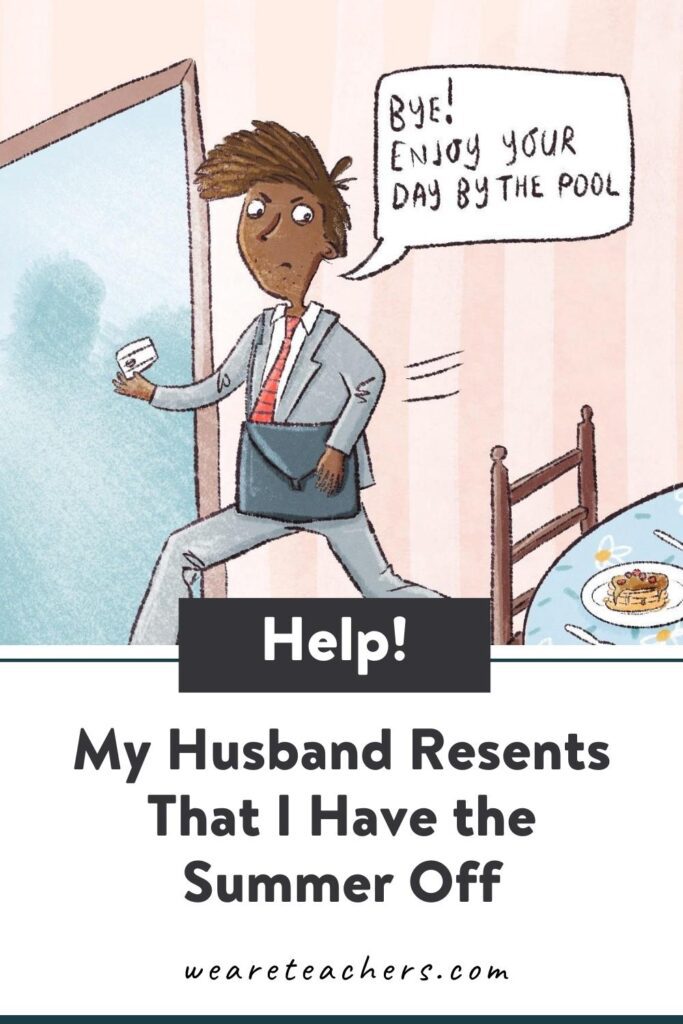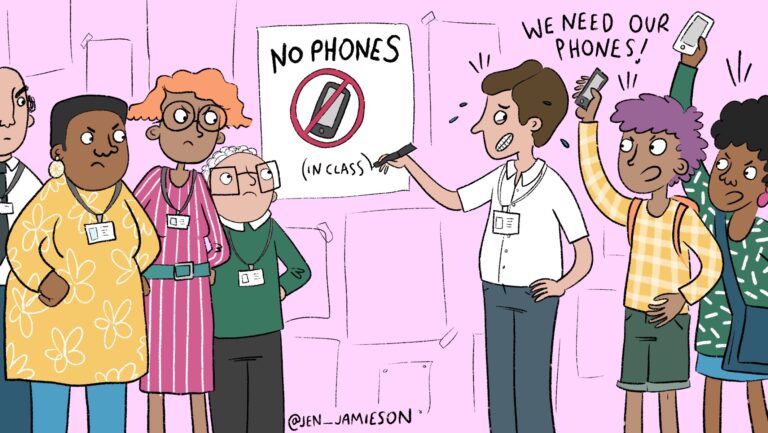Dear WeAreTeachers:
I just finished up my first year of teaching and am officially on summer break. I’ve noticed that any time my husband is reminded of the fact that I won’t be working for the next three months, it really gets under his skin. He’s never said anything actually rude or picked any fights with me about it but just makes comments here and there. “It’s getting late … well, I guess that doesn’t matter for you anymore,” etc. I feel that it’s more of a jealousy thing, being that he does not like his job at all and his salary is less than mine. I think that it’s hard to accept that I get this “perk” along with a higher salary. So how do I remedy this situation? —Don’t Be Jealous
Dear D.B.J.,
People often make jealous comments about teachers having summers off. What most people don’t realize is the emotional resilience that’s needed in order to be a strong, effective, healthy teacher who sticks it out for the long haul. Breaks aren’t just nice, they are necessary! Fortunately, the cyclical nature of teaching gives us the chance to release the prior year’s experiences and reset for the upcoming class—to fill our cups, if you will.
It sounds like you are being sensitive and aware of your partner’s reactions and feelings and some open communication will help you both go deeper. Make space to verbalize the concerns. The negative feelings fester when not tended to. Lexi Walters Wright, who contributes to the organization Understood, suggests some simple and profound ideas. Let go of having to be right. Be strategic about the timing of your talk. We all can relate to the frustration when someone drops a bomb of a comment as we are walking out the door. Listen more and listen well. Also, try reflecting back what your partner is saying to promote solid understanding. You might say, “Let’s pause a second to see if I’m understanding what you are saying. I heard …”
Hopefully, you two can find a balance that works for you with home chores, self-care, and shared experiences. How beautiful when friends and partners lean into shared joy. In the Book of Joy, the Dalai Lama reminds us, “We create most of our suffering, so it should be logical that we also have the ability to create more joy. It simply depends on the attitudes, the perspectives, and the reactions we bring to situations and to our relationships with other people. When it comes to personal happiness, there is a lot that we as individuals can do.”
Dear WeAreTeachers:
My new principal sent an email today telling us we need to adhere to our school dress code at our required summer out-of-state conference. This includes not having “unnaturally colored hair.” Mine is currently purple. It went purple on the last day of school. I’m at a charter and don’t have a contract. I really don’t care what the admin thinks about it. My plan is to smile and chalk it up to being summer. Any suggestions as to what to say when it gets brought up? Because it will and I’d rather be prepared. —Loosen Up
Dear L.U.,
It must be frustrating to be in a situation where there is hyper-focus on physical appearance over the substance of being an effective and joyful teacher. Being judged on how you look feels awful. I have to admit that it seems controlling to require adherence to the hair color dress code, especially during summer.
Many educational spaces are relaxing dress codes, especially after working from home during the pandemic when many of us were dressed more comfortably. Elizabeth Heubeck writes in Education Week that “teacher dress codes themselves are nothing new, although the parameters around them look far different than they did decades ago. An employee contract from the Ohio Education Association, dated 1923 and aimed exclusively at women, forbade female teachers from wearing bright colors or dyeing their hair, and required them to wear ‘at least two petticoats’ and dresses no more than 2 inches above the ankle. Times changed and, with them, teacher dress codes.”
Even though we have experienced shifts in dress codes, it is legal for employers to require dress codes. The Workplace Fairness organization emphasizes that employers can “regulate clothing, piercings, tattoos, makeup, nails, hair, and more. For the most part, these dress codes are legal as long as they are not discriminatory.” With that said, it still seems like you have two main options. Wear your hair how you want without saying anything and see if the leadership adheres to the dress code policy. And cross your fingers with this approach. Or you can request to meet with your principal and bring up your concerns about the dress code and hair color.
You might say, “Do you have a few minutes to talk about the dress code? I understand that as a staff we want to promote professionalism. In addition to appearance, professionalism is so much deeper. I think I’ve shown that my planning, teaching, collaboration, and communication are professional and student-centered. This seems more important than the color of my hair. I’d like to keep my hair color this summer and attend the conference the way I am.”
Dear WeAreTeachers:
I teach upper elementary and have a bubbly, energetic, younger colleague who teaches the same grade. She uses lots of incentives and rewards, takes selfies, and gives lots of freedom in the classroom. The students love her. I love my students and really enjoy teaching, but I believe in fostering more intrinsic motivation, and I’m less exuberant. I connect with my students, but it feels like it’s not on the same level. Some of my students wish they were in her class. I’m struggling with being seen as boring. How do I best navigate this? —Free To Be You and Me
Dear F.T.B.Y.A.M.,
Thank you for bringing up this bumpy situation. Tension in grade levels makes the already-challenging work strained. So often teachers feel like they are in a popularity contest they didn’t enter. It’s easy to say that every teacher brings different strengths and gifts to their job and that we are all unique and our diversity enriches the school community. The thing is, sometimes our negative chatter and insecurities get in the way of what we know and want to practice.
It doesn’t sound like your team partner is intentionally trying to make you feel bad. I’m guessing that you, like so many of us educators, are finding yourself in an internal battle about feeling good enough. Marcia Reynolds, Psy.D, in Psychology Today suggests that “your emotions are generally triggered when you feel the need to protect something important to you or you feel something important has been taken away, such as respect, achievement, significance, or feeling needed, valued or heard.”
Reynolds goes on to suggest that we “stop the spiral of negative self-judgment.” Have you done some contemplation on why you are triggered? What lies beneath these feelings? Try to build self-awareness and catch yourself when you feel that comparison is clouding your life. Then make the effort to reframe and think of what’s going well in your classroom. Pausing for gratitude is not fluff. It’s foundational for building confidence and well-being. Remember that learning doesn’t need to fit into the category of entertainment.
Your efforts to promote intrinsic motivation promote joy, deep learning, and self-efficacy. Even though it may be tempting to slip into the easier route of extrinsic rewards-driven motivation, stay on your path. You have seen your students thrive in those conditions. If you are wanting more “fun,” go ahead and try adding some new projects, interactions, or content. But there’s no need to try to be someone else. You are enough and your years of experience and reflection are important for sure.
Do you have a burning question? Email us at askweareteachers@weareteachers.com.
Dear WeAreTeachers:
Well, it happened. After a lunch conversation with my new teaching partner, I texted my friend my very raw, unkind takeaways. I accidentally sent it to the teaching partner instead of my friend. As soon as I realized it, I called her and told her that she was about to read some very strong, unfiltered feelings, and I apologized, but the damage is done. She says she needs time to process and is rightfully and understandably hurt and upset. This is not my finest moment as a human. Thanks for listening and sharing ideas on how to move forward.
Want more advice columns? Visit our Ask WeAreTeachers hub.


